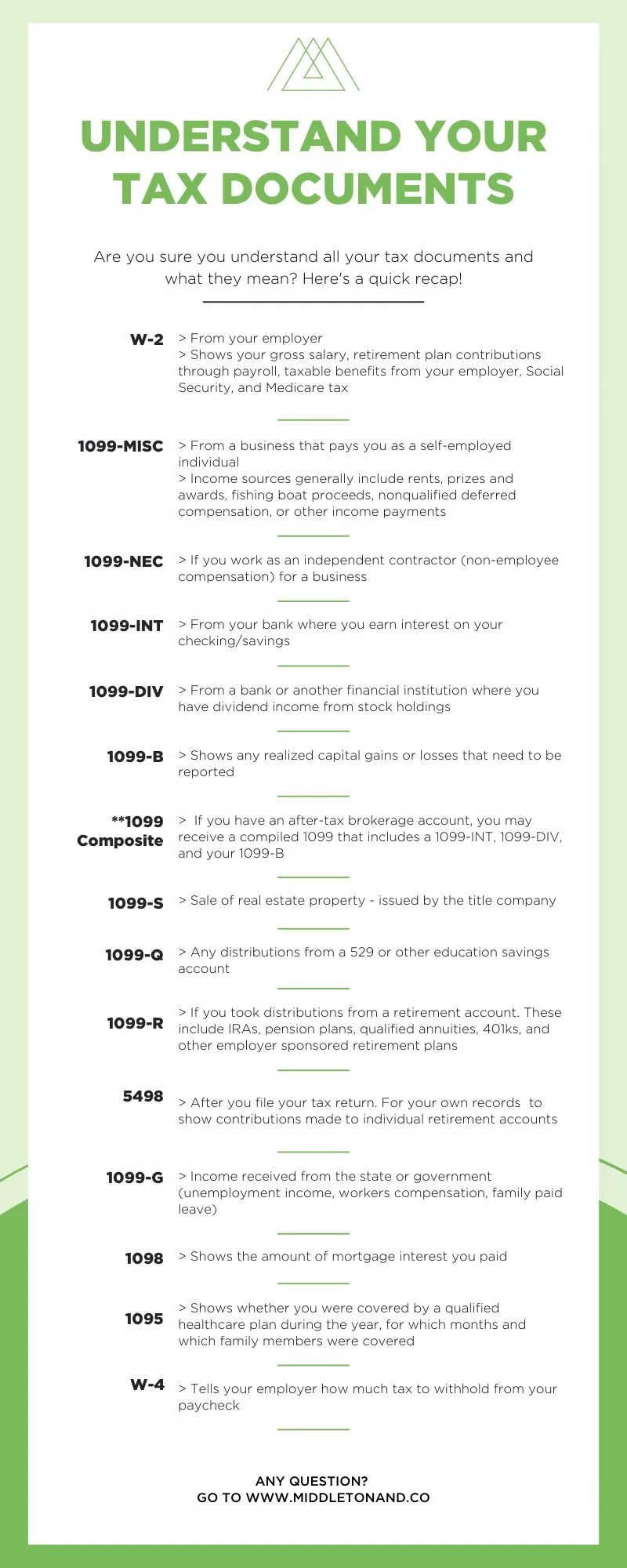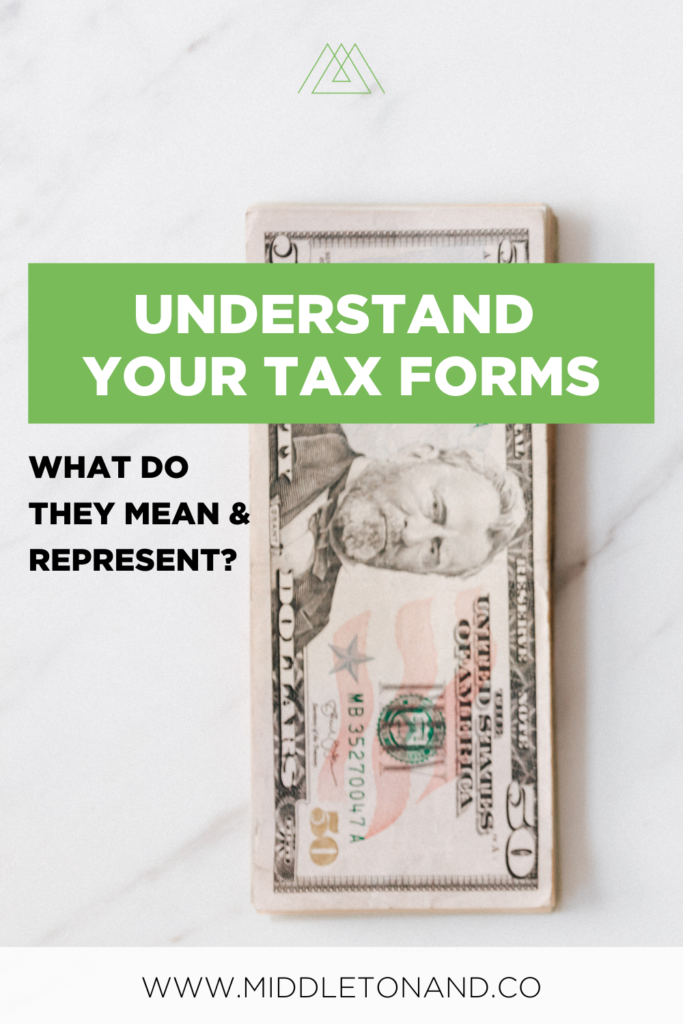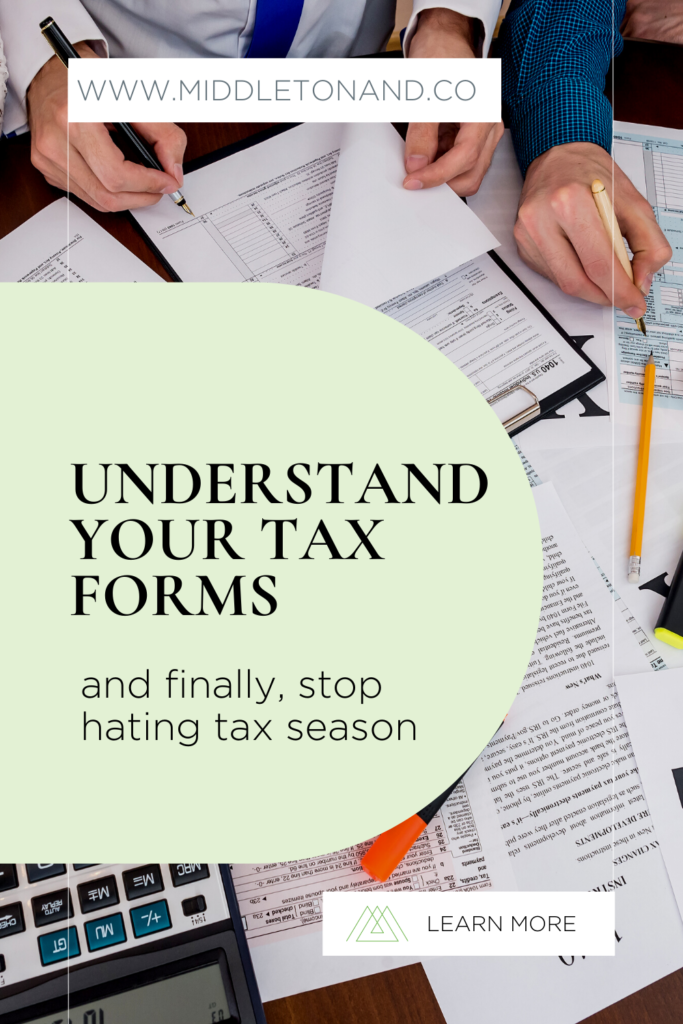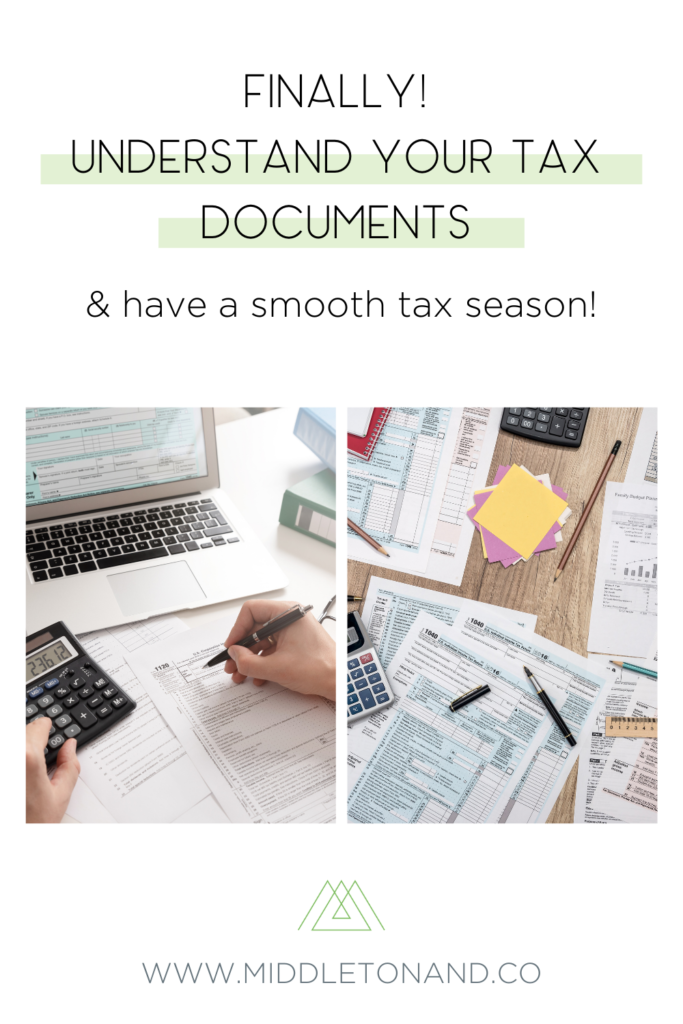It’s that time of the year again… Your mailbox has been filling up with tax documents and you may be asking yourself what the heck they’re all for.
If that’s you right now, don’t worry! You’re not alone! Tax documents can seem complicated when we’ve never really taken the time to understand what each one is for and why you received one (or didn’t).
Man, wouldn’t it have been great if they taught you all this in school?! But since they didn’t, we’re here to help!

W-2: Wages
Who are W-2 for?
- If you are working (and not self-employed or a contractor), you can expect to get this from your employer.
- If you changed jobs during the year or held more than one job in a single tax year, you should receive this (or another tax form below) from each employer you worked for.
This form shows:
- your gross salary
- any contributions you made to a retirement plan through payroll
- any taxable benefits you may have received from your employer
- and how much Social Security and Medicare tax you paid.
1099: Income Sources
There are different 1099 forms to pay attention to:
1099-MISC: Other Income
If you don’t receive your compensation as wages, you may receive this form instead of a W-2. You would typically receive this form from a business that pays you as a self-employed individual.
Income sources generally include:
- rents
- prizes and awards
- fishing boat proceeds, nonqualified deferred compensation
- other income payments.
1099-NEC: Independent Contractor Income
Another alternative to the W-2 is to work as an independent contractor (a non-employee). In this case, you may receive a 1099-NEC from the business you are working for.
1099-INT: Interest Income
You typically receive this from your bank where you earn taxable interest.
If you receive more than $10 in interest from any one person or institution, you would receive this form.
Interest is received on:
- bank accounts
- money market accounts
- certificates of deposit (CDs)
- corporate bonds
- treasury bills
- savings bonds
1099-DIV: Dividend Income
You typically receive this from a bank or another financial institution where you have dividend income from:
- stock holdings
- when a mutual fund distributes capital gains to shareholders
1099-B: Capital Gains/Losses
If you have an after-tax investment account and made any trades during the tax year, you will likely receive a 1099-B. This form shows any realized capital gains or losses that need to be reported.
**1099 Composite
If you have an after-tax brokerage account (i.e. investment account), you may receive a compiled 1099 that includes a 1099-INT, 1099-DIV, and your 1099-B.
1099-S: Sale of Real Estate
You receive this form if you sold real estate property. The 1099-S is typically issued by the title company.
Not all real estate proceeds are taxable, but you should still receive a 1099-S and include the income on your tax return.
1099-Q: Distributions for Education
You receive this form if you take any distributions from a 529 or other education savings account.
The custodian of the account is not required to determine if distributions are for qualified or nonqualified expenses, so make sure to keep good records of what the funds were used for.
1099-R: Retirement Distributions
You receive this if you took distributions from a retirement account. These include:
- IRAs
- pension plans
- qualified annuities
- 401ks
- other employer-sponsored retirement plans.
The 1099-R shows the gross amount distributed and any tax withheld. You will receive this even if you do a Rollover from one retirement account to another.
1099-G: Income from the Government
If you received any income from the state or government, you should expect to receive a 1099-G.
Examples might include:
- unemployment income
- workers compensation
- family paid leave.
1098: Mortgage Interest Paid
If you own a home and have a mortgage on it, you are likely paying some interest as part of your monthly payment. If so, you will receive a 1098, which shows the amount of mortgage interest you paid during the tax year.
1095: Healthcare Coverage
This shows whether you were covered by a qualified healthcare plan during the year, and if so, for which months and which family members were covered.
5498: Retirement Contributions
This form is typically generated in May after you have already filed your tax return. It is for your own records to show contributions made to individual retirement accounts (Roth or Traditional IRA)
W-4: Elect The Level Of Tax Withholding From Your Paycheck
It’s a good idea to review your tax withholding election each year as part of your annual tax filing.
The W-4 is the form we use to elect tax withholding on our wages or other income sources. Although it doesn’t get sent to you annually like other tax forms, you may want to consider updating your W-4 with your employer each year.
If you get a raise or have any other income changes mid-year, that’s another good time to review and update your tax withholding.
The sweet spot is making sure you have enough tax withheld that you don’t get a nasty tax bill when you file your tax return, but not too much that you are giving an interest-free loan to the government.
Understanding which tax forms you should expect to receive is the first step to making your tax season go smoothly!
If you think you’ve reached a level of complexity where you might need a professional to help with your taxes, click here. We explain the difference between a CPA and a CFP® professional and why you might need both on your tax planning team! Read more to learn how to be tax savvy this year!
⬇️SAVE THIS FOR LATER ⬇️
Pin it on your favorite board!📌

Understanding your current financial situationis a tool to embrace your wildest dreams.
Here at Middleton & Company, we believe that being in control of your financial situation (and your taxes!) starts with understanding what you have and where it’s going. Now that’s empowering!
Do you feel like you’re stuck where you are because of money? Like maybe it’s controlling you, rather than you controlling it? If so, let’s talk! We view money as a tool to support your dream life. Not the other way around!
As financial planners, we specialize in working with professionals who want to take an extended break from their career. Sound familiar? Great! How can you do it? WITH SMART FINANCIAL PLANNING!
Here are just a few ways we help you take control of your finances (and taxes!) to help plan for your sabbatical:
- Tax Report
Do you feel confident that you’re optimizing your tax situation? Each year, we run the Tax Report for our existing clients to analyze the previous year’s tax return. It helps us identify tax planning opportunities or pitfalls to avoid for the current year.
- Tax Letter
Do you know what tax forms you should expect to receive each year and why? Are you confused about how to answer the Tax Organizer questions your CPA sends you after year-end? We create personalized Tax Letters for each of our clients so they know what tax forms to keep an eye out for, important reminders of tax planning strategies we implemented during the year, and any additional notes to help the CPA complete the tax return correctly.
- Scenario Planning
If you’re planning on taking extended time away from work, do you know how to best take advantage of that low-income year? We use the Scenario Planning tool to illustrate the tax impact of different strategies or expected changes to income. We help identify how to take advantage of those income changes to make investment accounts more tax efficient for our clients.
- Mid-Year Tax Planning Meetings with CPAs
Each year, we offer to meet with our clients’ CPAs to have a brainstorm session about the tax planning strategies we are thinking about implementing. During that meeting, the CPA can run a pro-forma tax return to help us understand the tax impact, and highlight any guardrails we should be aware of. We love partnering with our clients’ CPAs to be intentional about the timing of strategies and to help avoid any unintended tax consequences.
Are you ready to feel empowered about your finances? Are you ready to make your money work toward your dream life? Learn more about our services now.
Wondering when it’s the best time to quit your job to travel the world? Check this out!
Stay in touch! Subscribe to our newsletter to get fresh tips on how to plan your dream sabbatical.
Like this article? Make sure to Pin It so you can go back to it later!




